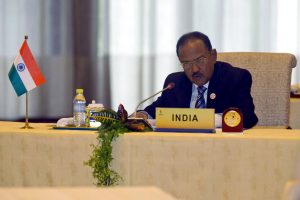Indian National Security Adviser (NSA) Ajit Doval is visiting Colombo between November 27 and 28 to take part in the 4th NSA Level Meeting on Trilateral Maritime Security Cooperation hosted by Sri Lanka this time. The first such meeting in six years, the dialogue mechanism involves the Maldives, in addition to India and Sri Lanka. As the Indian Ministry of External Affairs statement announcing Doval’s trip noted, the 2014 meeting also saw the participation of Mauritius and Seychelles. “The meeting will provide an opportunity for discussion on issues pertaining to cooperation in maritime security in the Indian Ocean region,” the statement said. The first such trilateral meeting took place in 2011.
This is the second time Doval is visiting the island nation, after a January trip following Gotabaya Rajapaksa’s victory in the Sri Lankan presidential elections last November.
The NSA-level meeting is significant for two reasons.
First, it involves both the Maldives and Sri Lanka, countries that — because of the leaders at their helm – have very different geostrategic orientations. Maldives’ President Ibrahim Solih has enthusiastically welcomed a greater role for India, as well as the United States, in the region. However this has not been the case so far with Sri Lanka since last year, with the Rajapaksa brothers back at the top. Even though Sri Lanka has rhetorically committed to an “India first” approach when it comes to security, the fine print indicates that Colombo will engage with other major powers – read, China for its economic development.
In fact, when it comes to both countries’ rather distressingly entangled economic and commercial relations with China, it is instructive to see the paths Solih’s Maldives and Gotabaya Rajapaksas’ Sri Lanka have taken since the election of both leaders, in 2018 and 2019 respectively.
The Solih government has increasingly relied on India for funding for key projects, as a move away from China. In August this year, following a meeting between the Indian and Maldivian foreign ministers, India announced a $500 million package for a key infrastructure project along with an additional $ 350 million in aid. Reports suggest that the Maldives is also considering scrapping the free trade agreement with China that Solih’s predecessor Abdulla Yameen entered into.
Contrast this with what Sri Lanka under the presidency of Gotabaya Rajapaksa has done. The Hindu reported last month that during THE visit of a Chinese delegation led by Yang Jiechi, China’s foreign policy czar, Gotabaya agreed to revive discussions for a China-Sri Lanka free trade agreement (FTA) along with committing to speed up the completion of the Hambantota Industrial Zone and the Port City in Colombo. Both countries had begun talks around an FTA in 2013. At the same time, Sri Lanka continues to snub a grant from the U.S. through the Millennium Challenge Corporation.
The second significance of the ongoing trilateral NSA level meeting in Colombo lies with how India’s Doval, who sits at the top of India’s intelligence services, is perceived there. Following his electoral defeat then-president (and now prime minister) Mahinda Rajapaksa directly blamed Indian intelligence as being behind it. “Both the US and India openly used their embassies to bring me down,” Rajapaksa told the South China Morning Post in an interview in 2015. More pointedly, during an event in 2017, Gotabaya directly pointed fingers at Doval, blaming his “China obsession” for the downturn in India-Sri Lanka relations. Doval had met with then-opposition leader Maithripala Sirisena two months before Sirisena bested Mahinda Rajapaksa in the 2014 Sri Lankan presidential elections.
At the same time, credible reports also suggest that Indian intelligence services may also have contributed to Abdulla Yameen’s political downturn, leading to Solih’s victory in 2018. Interesting, they also suggest that the architect behind both reversals — Mahinda’s in 2014 and Yameen’s in 2018 — may have been the same individual, K Illango, a senior officer in India’s Research and Analysis Wing.
In the fluid world of South Asian geopolitics – where the rise and fall of political fortunes of leaders in smaller countries have often, historically, been linked with how bigger powers perceive them – all these skullduggery may indeed be a minor bump in the road for all concerned.
That said, this background when it comes to Doval will surely color – even if it is just a little – his interactions in Colombo, especially as India, the Maldives, and Sri Lanka discuss matters of common concern.

































